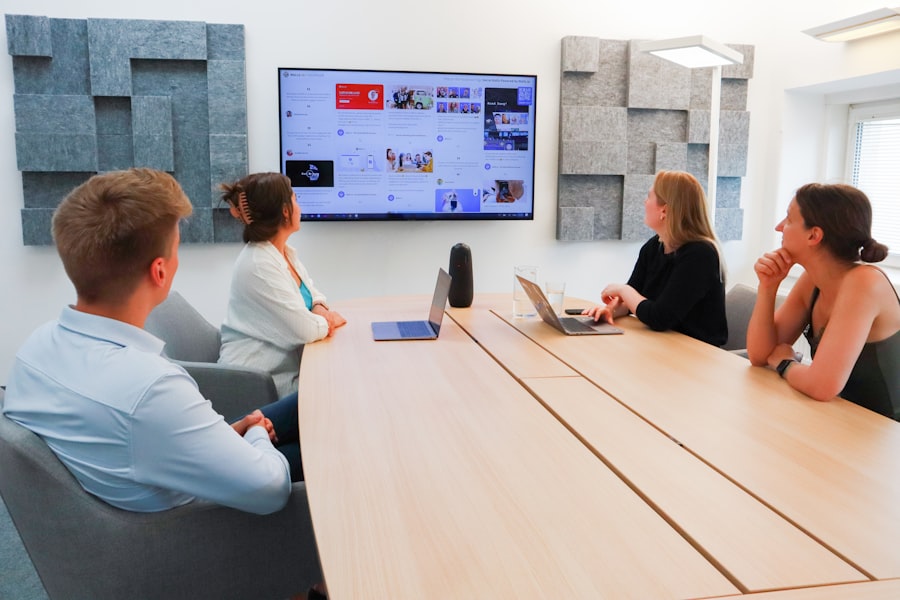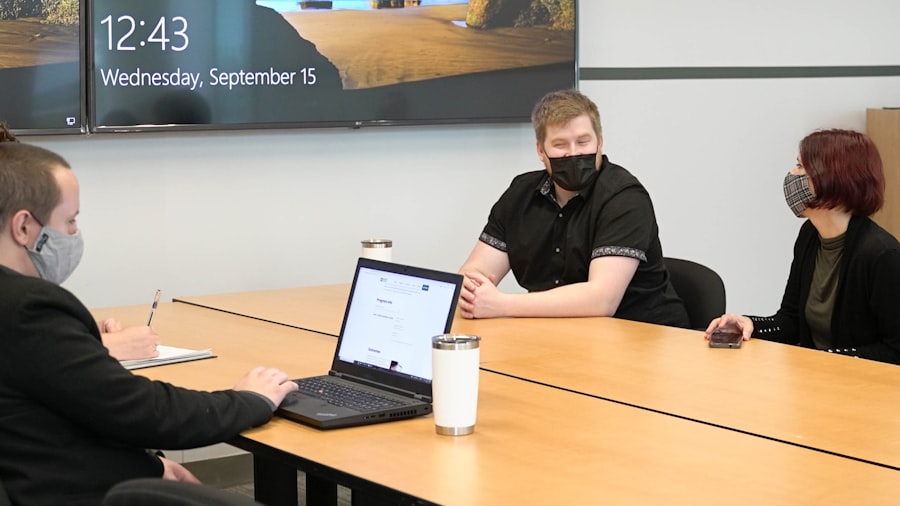Effective workplace communication skills are essential for organizational success. Communication forms the basis of all business interactions, and its absence can negatively impact productivity and efficiency. Strong communication skills are vital for building relationships with colleagues, clients, and stakeholders.
Clear and concise communication helps prevent misunderstandings, conflicts, and errors, fostering a more harmonious and productive work environment. These skills are crucial for conveying ideas, sharing information, and making decisions, all of which are key components of successful business operations. Moreover, effective communication skills enhance leadership abilities.
Leaders must communicate effectively with their teams to motivate, inspire, and guide them towards achieving common goals. Without this skill, leaders may struggle to convey their vision, provide feedback, or address team concerns. In today’s globalized and diverse workplace, the ability to communicate across cultures and languages is increasingly important.
Employees with strong communication skills can bridge cultural gaps and promote a more inclusive and collaborative work environment. In summary, workplace communication skills are crucial for organizational success. They facilitate collaboration, prevent misunderstandings, and enhance leadership abilities.
In the current diverse and fast-paced work environment, effective communication skills are more important than ever.
Key Takeaways
- Effective workplace communication skills are crucial for success in any job.
- Active listening involves giving full attention to the speaker and showing understanding through verbal and nonverbal cues.
- Effective verbal communication requires clarity, conciseness, and consideration of the audience.
- Nonverbal communication cues such as body language and facial expressions can greatly impact the message being conveyed.
- Conflict resolution strategies involve active listening, empathy, and finding mutually beneficial solutions.
Active Listening Techniques
The Benefits of Active Listening
By actively listening to colleagues, employees can demonstrate respect, empathy, and understanding, leading to stronger relationships and the prevention of misunderstandings. This, in turn, can lead to better problem-solving and conflict resolution. When employees feel heard and understood, they are more likely to open up about their concerns and work together towards finding solutions.
Building Trust and Rapport
Active listening can also help build trust and rapport with colleagues, as it shows that their opinions and perspectives are valued. This can lead to improved productivity and efficiency, as it reduces the likelihood of errors and misunderstandings that can arise from miscommunication.
Essential for Effective Workplace Communication
In summary, active listening techniques are essential for effective workplace communication. They demonstrate respect, empathy, and understanding, leading to stronger relationships and better problem-solving. By actively listening to colleagues, employees can build trust and rapport while improving productivity and efficiency.
Effective Verbal Communication

Effective verbal communication is a key skill for success in the workplace. It involves speaking clearly, confidently, and concisely to convey ideas, share information, and engage with colleagues. Effective verbal communication also includes using appropriate tone and language for different situations, such as formal presentations, team meetings, or one-on-one discussions.
By mastering effective verbal communication skills, employees can articulate their thoughts and ideas in a way that is easily understood by others. Furthermore, effective verbal communication can also lead to better collaboration and teamwork. When employees are able to express themselves clearly and confidently, they can contribute more effectively to group discussions and decision-making processes.
Effective verbal communication can also help in building rapport with colleagues, as it fosters a sense of trust and understanding. Additionally, strong verbal communication skills are essential for leadership roles, as they enable leaders to inspire, motivate, and guide their teams towards achieving common goals. In conclusion, effective verbal communication is essential for success in the workplace.
It involves speaking clearly, confidently, and using appropriate tone and language for different situations. By mastering effective verbal communication skills, employees can contribute more effectively to teamwork and collaboration while building rapport with colleagues.
Nonverbal Communication Cues
Nonverbal communication cues play a significant role in workplace interactions. They include body language, facial expressions, gestures, posture, and eye contact. Nonverbal cues can convey emotions, attitudes, and intentions that may not be expressed through words alone.
Understanding nonverbal communication cues is essential for interpreting the true meaning behind a colleague’s words and actions. Moreover, nonverbal communication cues can also impact how others perceive us in the workplace. For example, maintaining good posture and making eye contact during a presentation can convey confidence and credibility.
On the other hand, avoiding eye contact or fidgeting may be perceived as nervousness or lack of confidence. Being aware of nonverbal cues can help employees present themselves in a way that aligns with their intended message. Additionally, nonverbal communication cues can also influence how others respond to us.
For example, a warm smile or a firm handshake can create a positive first impression during a job interview or a client meeting. Conversely, crossed arms or a furrowed brow may signal defensiveness or disagreement. By being mindful of nonverbal cues, employees can better understand how their actions may be perceived by others in the workplace.
In summary, nonverbal communication cues play a significant role in workplace interactions. They can convey emotions, attitudes, and intentions that may not be expressed through words alone. Understanding nonverbal cues is essential for interpreting the true meaning behind a colleague’s words and actions while also influencing how others perceive us in the workplace.
Conflict Resolution Strategies
Conflict is inevitable in any workplace setting, but how it is managed can make a significant difference in the overall work environment. Conflict resolution strategies are essential for addressing disagreements or disputes in a constructive manner. These strategies include active listening to understand all perspectives, finding common ground through compromise or collaboration, and seeking mutually beneficial solutions.
Moreover, effective conflict resolution strategies also involve maintaining professionalism and respect during difficult conversations. It is important for employees to remain calm and composed while addressing conflicts in the workplace. By doing so, they can prevent conflicts from escalating further and maintain positive working relationships with colleagues.
Additionally, conflict resolution strategies can also lead to improved teamwork and collaboration. When conflicts are addressed openly and constructively, it can lead to better understanding among team members and foster a more cohesive work environment. Furthermore, resolving conflicts in a timely manner can prevent them from negatively impacting productivity or morale within the organization.
In conclusion, conflict resolution strategies are essential for maintaining a positive work environment. They involve active listening, finding common ground through compromise or collaboration, and maintaining professionalism during difficult conversations. By addressing conflicts constructively, employees can improve teamwork and prevent negative impacts on productivity or morale.
Building Rapport with Colleagues

The Benefits of Building Rapport
Building rapport with colleagues can lead to improved teamwork and collaboration. When employees have strong working relationships with their colleagues, they are more likely to communicate openly and work together effectively towards common goals. Building rapport can also lead to increased job satisfaction and morale within the organization.
Conflict Resolution and Problem-Solving
Additionally, building rapport with colleagues can also lead to better conflict resolution and problem-solving. When employees have established trust and understanding with their colleagues, they are more likely to address conflicts constructively and find mutually beneficial solutions. Furthermore, building rapport can also lead to increased support from colleagues during challenging times or when facing difficult tasks.
A Positive Work Environment
In summary, building rapport with colleagues is essential for creating a positive work environment and fostering strong working relationships. It involves establishing mutual trust, respect, and understanding through open communication, active listening, empathy, while leading to improved teamwork, collaboration, better conflict resolution, problem-solving, increased job satisfaction, and morale within the organization.
Using Technology for Communication
Technology has revolutionized the way we communicate in the workplace. From emails to video conferencing to instant messaging platforms, technology has made it easier than ever for employees to connect with one another regardless of physical location or time zone differences. Using technology for communication allows for quick dissemination of information sharing of documents scheduling meetings without the need for face-to-face interaction.
Moreover using technology for communication also allows for greater flexibility in how employees choose to communicate with one another. Whether it’s through email instant messaging or video conferencing employees have the ability to choose the most appropriate method of communication based on the nature of the message or the urgency of the situation. Additionally using technology for communication also allows for greater efficiency in how information is shared within an organization.
Documents can be easily shared edited collaborated on in real-time through cloud-based platforms reducing the need for lengthy email chains or physical document exchanges. In conclusion using technology for communication has revolutionized the way we connect with one another in the workplace allowing for quick dissemination of information greater flexibility in how employees choose to communicate with one another greater efficiency in how information is shared within an organization through cloud-based platforms reducing the need for lengthy email chains or physical document exchanges
If you’re looking to improve your workplace communication skills, you may also be interested in learning how to build and maintain a strong professional reputation. This article from Careers Help provides valuable insights and tips on how to establish yourself as a reliable and respected professional in your field. Developing strong communication skills is just one aspect of building a positive reputation in the workplace, and this article offers additional guidance on how to succeed in your career.
FAQs
What are workplace communication skills?
Workplace communication skills refer to the ability to effectively convey and receive information in a professional setting. This includes verbal and nonverbal communication, active listening, and the ability to adapt communication style to different situations and audiences.
Why are workplace communication skills important?
Effective communication is essential for a productive and harmonious work environment. It helps to build strong relationships, resolve conflicts, and ensure that tasks and projects are completed efficiently. Good communication skills also contribute to a positive company culture and employee satisfaction.
How can I improve my workplace communication skills?
Improving workplace communication skills can be achieved through various methods, such as active listening, practicing empathy, being clear and concise in your communication, seeking feedback, and being open to constructive criticism. Additionally, developing emotional intelligence and understanding nonverbal cues can also enhance communication skills.
What are some common barriers to effective workplace communication?
Common barriers to effective workplace communication include poor listening skills, lack of clarity in communication, cultural differences, language barriers, distractions, and emotional barriers such as stress or personal biases. Identifying and addressing these barriers is crucial for improving communication in the workplace.
How can I communicate more effectively with my colleagues?
To communicate more effectively with colleagues, it’s important to be clear and concise in your messages, actively listen to their input, show empathy and understanding, and adapt your communication style to their preferences. Building rapport and trust with your colleagues can also facilitate better communication.



